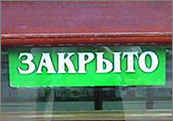| FR | About us | Home | User agreement | Link to us |
Adverbs of Place
Adverbs of place designate a place of action, point of departure or direction of movement. They answer the questions Где? (Where?), Куда? (Where to?), Откуда? (From where?).
The following table illustrates how adverbs of place are grouped depending on the question they answer.
| Где? | Куда? | Откуда? |
| Он
здесь. (He's here.) |
Он идёт
сюда. (He's going here.) |
Я
отсюда не уйду. (I'll not move from here.) |
| Он там. (He is there.) |
Он идёт туда. (He's going there.) |
Он пришёл оттуда. (He came from there.) |
| Он
справа от меня. (He's on my right.) |
Он повернул
направо. (He turned to the right.) |
Справа
от вас дерево. (You have a tree on your right.) |
Forming the Russian Adverbs of Place
Most adverbs of place are formed by joining prepositions with nouns in the corresponding case. Playing the role of adverbs, these junctions do not change by gender, number or cases.
| Preposition | Noun | Resulting adverb |
| в | верх | вверх (up) |
| с | зад | сзади (back) |
| из | нутро | изнутри (internally) |
Adverbs of place often include genitive and prepositional nouns ending in -y, as in наверху (above), внизу (below), сверху (from above), снизу (from below).
Using the Adverbs of Place
Adverbs of place can be used with the particles -то, -нибудь, кое- to indicate a certain degree of generality or uncertainty:
- 1. use the particle
-то
when you are uncertain about exact place or direction
Машина куда-то едет.
(The car is going somewhere.)
the speaker is not sure where it goes exactly
Он живёт где-то в Москве.
(He lives somewhere in Moscow.)
the speaker does not know about the exact location
- 2. use -нибудь
to be general about options to be made
Давай поедем куда-нибудь.
(Let's go somewhere.)
it's not important where to go exactly
Установи палатку где-нибудь возле озера.
(Put up a tent somewhere near the lake.)
the exact location near the lake is not important for the speaker
- 3. use
кoe-
when you know exact place or direction but do not want to talk about
it for some reason. This particle is rarely used in Russian.
Koe-где в этой комнате спрятан ключ. Найдите его.
(There is a key hidden somewhere in this room. Find it.)
Adverbs of place can also be used with the negative particles
ни and
не in front of them. The particle
ни
is used in personal sentences, while the particle
не
is used in impersonal sentences. Compare these two examples:
Я никуда не пойду.
(I will not go anywhere.)
Мне некуда пойти.
(I have nowhere to go.)
Note that the verb пойти is in the infinitive because the sentence is impersonal.
Related Lessons
 Russian Lessons
Russian Lessons
- Russian alphabet
- Names of letters
- Russian Q&A new
- Pronunciation: Cons.
- Pronunciation: Vowels
- Noun Gender/Number
- Cases of Nouns
- Russian Greetings
- Personal Pronouns
- Learning Russian
- 1000 Common Words
- 500 Russian Verbs
- Top Russian Nouns
- » All lessons
- » Guest lessons
 Browse Topics
Browse Topics
- Start learning Russian
- Forum
- Bookstore
- Dictionaries
- Russian - basic
- Russian - adv
- Pronunciation
- Russian Blog new
- Reading
- Test & quizzes
- Translation
- Verbs
- Verb Conjugations
- Russian numbers
- Russian Tests new
- Vocabulary
- Writing
- Folk music
- Fun stuff
- Leo Tolstoy
- Learner's lore
- Literature
- Personal blogs
- Picture Dictionary new
- Proverbs
- Publications
- Radio & TV
- Russian culture
- Schools in Russia
- Russian Words
- Russian names
- Software
- Russian Words iPhone

Search MasterRussian

English » Russian dictionary

WORD OF THE DAY
![]() RSS
|
iGoogle
|
My Yahoo!
RSS
|
iGoogle
|
My Yahoo!
Meaning: to be able to, can, may
Pronunciation: [mohch']
Learn Russian words more... »
TODAY'S STREET SIGN

Russian: Закрыто
English: Closed
FOLLOW US ON TWITTER

MasterRussian on Twitter


